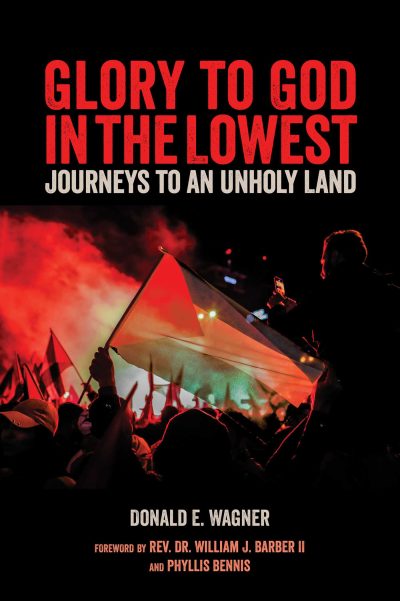Glory to God in the Lowest – Journeys to an Unholy Land
Book Review

All Global Research articles can be read in 51 languages by activating the Translate Website button below the author’s name.
To receive Global Research’s Daily Newsletter (selected articles), click here.
Follow us on Instagram and Twitter and subscribe to our Telegram Channel. Feel free to repost and share widely Global Research articles.
***
In “Glory to God in the Lowest” Donald Wagner set out three themes for his memoirs: his transition from political apathy and social conservatism to activism in the civil rights and anti-war movements; a theological transition from fundamentalist Christian zionism to progressive and liberation theology; and advocacy for Palestinian political and human rights. He succeeds remarkably well in all three areas.
It is an amazing journey, one that he shared with many fellow travelers, and Wagner describes it in a clear, concise and compelling narrative. A fourth theme, related to the others, is his ongoing use of the idea of pilgrimage, not as a fixed journey to a definite end, but the journey itself, of humbling oneself before God and others in order to work for the betterment of humanity.
His theme of liberation theology took him from a conservative white evangelistic background, into the realm of the civil rights movement during its main activity in the 1960s and 1970s allied with the anti-war movement against the Vietnam war – and ultimately, all wars. Working as a pastor in a black church introduced him to what he describes as a community in comparison to the individualistic approach of the white society surrounding him. That idea became much more strongly emphasized on his travels to the Middle East where he found the community, the hospitality, and friendliness of the people to be a major factor in their societies.
Palestine became the focus of much of his activities as he witnessed, in both the Christian sense and the purely gut wrenching physical sense, the atrocities being committed by Israel against the Palestinians. He watched the Israeli bombing of Beirut before the Lebanon invasion, and its devastating toll on Palestinian civilians in spite of Israel propaganda that they used only high precision military weapons on Palestinian terrorists. He was in Beirut again the days after the Sabra and Shatila massacres by the Phalangist militia protected and promoted by the Israeli army and witnessed the devastation of the refugee camps.
On the advice of the people he met in the Middle East, he recognized that his main mission was to tell the people of the United States what their government and their military was doing. That involved working with different churches who worked against the false ideas of antisemitism that were used for the Israeli narrative. In turn that was a theological fight against Zionism in all its forms.
Wagner identified two main types of Zionism. The first, and original, is the fundamentalist evangelical Zionism promoting the ‘end times’ of humanity in which all the Jews are to gather in Israel and either convert or die. The second form of Zionism is the European/western version that uses the holocaust as the reason for the establishment of a Jewish state on someone else’s land. This is Herzl’s version of Zionism which Wagner describes in one sentence “Zionism’s goal was to take the land and remove the Palestinians: a clear case of genocide.”
The latter form could also be described as political Zionism as it derives from the social conditions of Europe during a time when nationalism was a driving force for Europe in general – “a political ideology of Jewish nationalism….The liberal adoption of far-right zionism as the abandonment of human rights and international law.” Both aspects of zionism come together in the United States: the millennial end times and the nationalist holocaust driven narrative. Wagner, among many others, sees the United States as the largest supporter of Israel economically, politically, and militarily, each using the other for their own purposes.
Further to the ideas of liberation theology is the idea of a colonial-settler colonialism “a system of power that perpetuates genocide and repression of indigenous peoples and cultures.” This was, and is, aided by the Papal “Doctrine of Discovery” that essentially said to European empires to go and grab as much of the world’s land as you can for they are only inhabited by savages and lesser beings. In Palestine, this idea of terra nullius, of empty land to be settled and exploited by Europeans, became a part of the founding mythology within the Israeli narrative.
In his conclusion, Wagner writes, “Glory to God in the Lowest….[may] one day blossom with the fruits of equality, justice, freedom, reconciliation, and peace for every nation. This is a vision we cannot afford to surrender and it’s worth the sacrificial love and advocacy of every one of us.”
Wagner’s memoir, “Glory to God in the Lowest”, is a powerfully written work. It should be a bestseller, it should be on everyone’s shelf who has any interest in the Middle East. It is an intense work, motivating and compelling, inspirational for both Christians and non-Christians alike.
*
Note to readers: Please click the share buttons above. Follow us on Instagram and Twitter and subscribe to our Telegram Channel. Feel free to repost and share widely Global Research articles.
Jim Miles is a regular contributor to Global Research.

